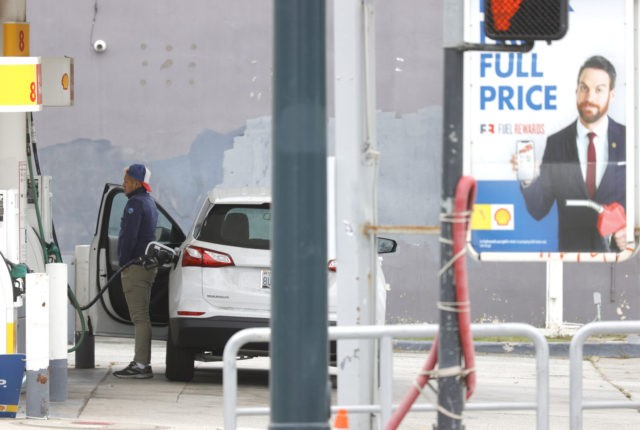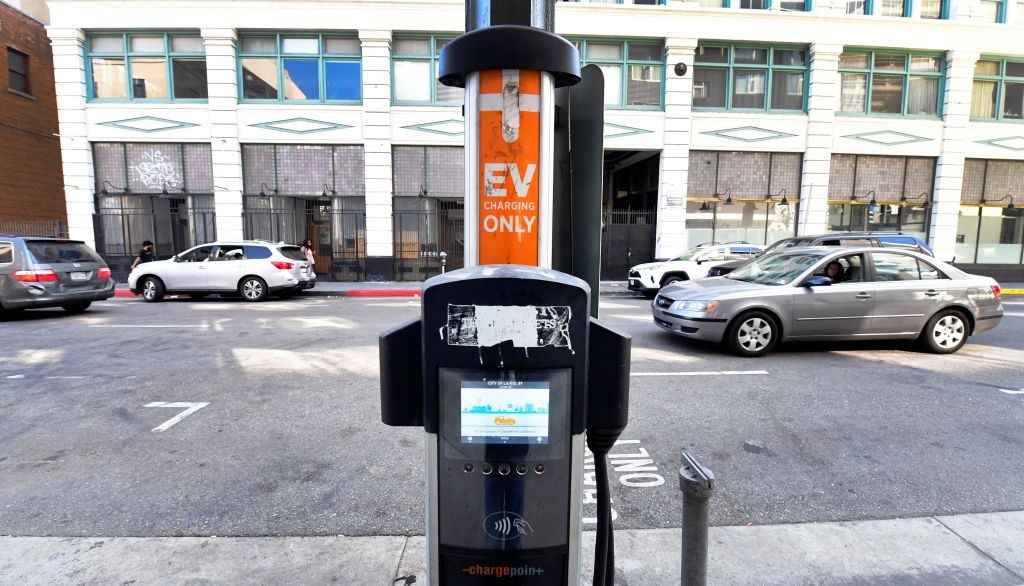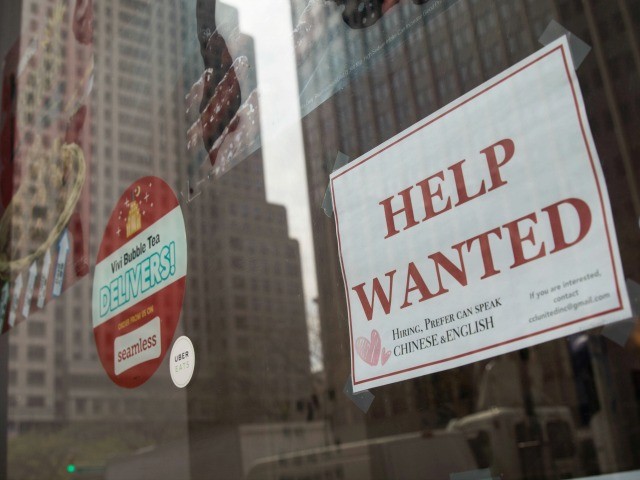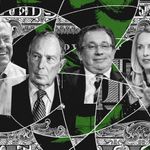Biden’s Build Back Better: IRS Audits for Working Class, Tax Cuts for the Rich
JOHN BINDER
President Joe Biden and Democrats are hoping to squeeze an extra $200 billion in tax revenue out of American taxpayers by mostly targeting working and middle class households with Internal Revenue Service (IRS) audits.
As part of Biden’s “Build Back Better Act,” which was already passed by House Democrats, nearly 600,000 more working and middle class Americans earning $75,000 or less a year would be audited by the IRS, an analysis by Republican lawmakers reveals.
“Democrats’ tax and spending spree will more than double Americans’ chances of being audited as it targets lower and middle-income earners,” the analysis states:
The proposal will lead to an additional 1.2 million IRS audits each year, nearly half of which will hit middle class families making less than $75,000. All this so Democrats can wring an extra $200 billion out of the American people, particularly from middle class families and small businesses.
[Emphasis added]
Biden’s plan to supercharge the IRS with $80 billion in mandatory funding and 87,000 new IRS agents will lead to drastically higher audit rates for all Americans at every income level according to the Congressional Budget Office. [Emphasis added]
Specifically, more than 583,000 of the new IRS audits will target working and middle class Americans earning $75,000 or less. Of those 583,000 new IRS audits, more than 313,000 would target the poorest of Americans who earn $25,000 or less a year.
In addition, Biden’s Build Back Better Act will “mean more than 800,000 more federal tax liens on taxpayer property such as homes and vehicles,” the analysis states.
Also, because the majority of underreported income to the IRS is from those earning $0 to $200,000 a year, the plan will mean more targeting of not only working and middle class Americans but also small businesses.
“The Biden plan will mean more audits of the middle class and lower-income Americans, 800,000 more federal tax liens per year, and more IRS shakedowns of American families and small businesses,” the analysis states.
At the same time, Biden’s Build Back Better Act would provide a $625 billion tax cut for the wealthiest Americans living in blue states — paid for by working and middle class Americans — as a result of an increase in the State and Local Tax (SALT) deduction cap.
The plan gives a tax cut to 66 percent of Americans earning more than $1 million annually while 78 percent of Americans earning $500,000 to $1 million will get a tax cut. Meanwhile, just 27 percent of Americans earning $75,000 to $100,000 would see a tax increase along with 19 percent of Americans earning $50,000 to $75,000.
John Binder is a reporter for Breitbart News. Email him at jbinder@breitbart.com. Follow him on Twitter here.
This is because despite all its declarations, the Democratic Party is not a party of workers. It, as Biden’s transition team attests, is a party of Wall Street, big banks, Amazon, and the military-industrial complex.
Inside Jeff Bezos Mansions
Jeff Bezos' $400 Million Flying Fox Yacht
https://www.youtube.com/watch?v=MRYEcushHjc
Inside Jeff Bezos' $21,000,000 Car Collection
https://www.youtube.com/watch?v=Yu-Vy9Q6U4A
Chuck Schumer Pushes Tax Cut for Richest 1% in Coronavirus Relief Bill
JOEL B. POLLAK
Senate Minority Leader Chuck Schumer (D-NY) is pushing for a repeal of the state and local tax (SALT) deduction cap in the next round of coronavirus relief — giving a tax cut to the wealthiest 1% of taxpayers, especially in “blue” states.
In his landmark tax reform law, the Tax Cuts and Jobs Act of 2017, President Donald Trump and the Republicans offset some of the revenue losses from low tax rates by restricting deductions. The law capped the SALT deduction at $10,000.
Previously, those taxpayers wealthy enough to file a list of itemized deductions could count all of the taxes they paid to state and local governments toward a deduction in their federal tax liability. That meant wealthy taxpayers in the most heavily taxed states — primarily run by Democrats — benefited most. The SALT deduction also gave Democrats political room to raise taxes higher, because it made rich taxpayers less likely to resist: they could claim some of the money back.
Trump ended the deduction — at some political cost to himself. Republicans went on to lose congressional seats in wealthy suburbs in high-tax Democrat-run states. Orange County, California, for example, flipped entirely to Democrats.
But Democrats still want to repeal the SALT cap, regardless, because they want their state and local governments to avoid tax cut — and because their wealthy campaign contributors want to be subsidized, once again, by the rest of the country.
Even Seth Hanlon, a former Obama administration official who is now a senior fellow at the left-wing Center for American Progress, has protested against Schumer’s idea, noting that repealing the SALT cap would help “the top 1%.”
Come on, not this again.
Repealing the SALT cap for 2020-21 would be a $137 billion tax cut, with about 63% going to the top 1%.
It does nothing for states and localities except potentially crowd out the actual fiscal relief they urgently need. https://t.co/jlSjIhnzpq
— Seth Hanlon (@SethHanlon) July 15, 2020
Here is the national distribution of the tax cut from repealing the SALT cap, via @iteptweets.
A tiny percentage of middle-income people get any benefit.
The top 1% gets 63%: an avg. $35k tax cut for them.
The top 5% gets 87%.
The bottom 80% get literally 1% of the benefit. pic.twitter.com/8EIav7wgcJ
— Seth Hanlon (@SethHanlon) July 15, 2020
Here is the distribution just for New York. Largely the same story. A few more middle-income people benefit a little compared to nationwide, but still, the tax cut goes overwhelmingly to top one-percenters. Not the people most affected by COVID!!! pic.twitter.com/Dp0evxq3P7
— Seth Hanlon (@SethHanlon) July 15, 2020
The basic story is the same in every state. State by state estimates are here. https://t.co/1KREhnb6et
— Seth Hanlon (@SethHanlon) July 15, 2020
The Democrat-run House of Representatives has already passed a repeal on the SALT cap that would be effective for two years.
According to The Hill, “Schumer urged Senate Majority Leader Mitch McConnell (R-Ky.) [on Tuesday] to ‘join the House, and join the Democrats in the Senate, and get rid of that cap.'”
Schumer also vowed to make the SALT deduction — the effective tax cut for the 1% — permanent: “If I become majority leader, one of the first things I will do is we will eliminate it forever,” he added, according to The Hill. “It will be dead, gone and buried.”
Joel B. Pollak is Senior Editor-at-Large at Breitbart News and the host of Breitbart News Sunday on Sirius XM Patriot on Sunday evenings from 7 p.m. to 10 p.m. ET (4 p.m. to 7 p.m. PT). His new book, RED NOVEMBER, tells the story of the 2020 Democratic presidential primary from a conservative perspective. He is a winner of the 2018 Robert Novak Journalism Alumni Fellowship. Follow him on Twitter at @joelpollak.
House Democrats pass stripped-down social welfare bill with massive tax cut for the rich
Barry Grey
On Friday morning, the House of Representatives passed its version of President Joe Biden’s $1.75 trillion “Build Back Better” social welfare and climate bill. As expected, the measure was approved on a party-line vote, with 220 Democrats voting “Yes” and all 212 Republicans voting “No.” One Democrat, Jared Golden of Maine, a conservative former Marine who served tours of duty in Iraq and Afghanistan, broke ranks and voted in opposition to the bill.
Golden had announced that he would oppose the bill because it included a massive tax break for the wealthy. The outcome of months of internal Democratic Party wrangling was the decision of the Biden White House and the party leadership to strip the bill of all major tax increases opposed by big business and slash the top line figure for social programs and climate protection in half, from $3.25 trillion to $1.75 trillion over 10 years.
That, however, did not satisfy the Wall Street and corporate interests that dictate government policy and control both major parties. Earlier this month, House Speaker Nancy Pelosi incorporated into the bill a measure demanded by wealthy donors in high-tax states such as New York, New Jersey and California. It was the lifting of a $10,000 cap on deductions on federal income taxes to compensate for state and local taxes. The cap was imposed as part of the Trump tax bill passed in December of 2017, which slashed taxes for corporations and the wealthy.
Until then, there was no limit on the amount of federal tax deductions for state and local taxes that wealthy people in generally pro-Democratic high-tax states could claim by itemizing their federal tax returns. In imposing the limit, Trump and the Republicans were targeting states that historically vote “blue” in federal elections.
This infuriated the Democrats’ wealthy backers, who demanded that the Biden budget bill raise the limit on so-called SALT (state and local tax) deductions. The Democrats acceded by adding to the bill a provision raising the limit to $80,000 for each of the next nine years.
The Congressional Budget Office estimates that this tax windfall for the wealthy will cost the federal government $285 billion over the 10-year span covered by the bill, making it the second most costly item in the legislation. It is topped only by a combined $390 billion for universal pre-school for three- and four-year-old children and limited subsidies for child care.
It is considerably higher than the allocation for clean energy and climate resilience ($220 billion), four weeks of paid family and medical leave ($195 billion), clean energy and electricity tax credits ($190 billion), affordable housing ($170 billion), Medicaid home- and community-based services ($150 billion), a one-year extension of the expanded child tax credit ($130 billion), and tax credits for health insurance premiums under Obamacare ($125 billion).
It would help pay for programs that were severely cut or dropped outright from the bill under pressure from big business and its most open mouthpieces in the Democratic Party, such as senators Joe Manchin of West Virginia and Kyrsten Sinema of Arizona. These include free community college (eliminated); the ability of Medicare to negotiate drug prices with the pharmaceutical industry, thereby lowering their costs (reduced to a shell program affecting only a handful of drugs and not even starting until 2024); and Medicare coverage for dental, hearing and vision (reduced to limited subsidies for hearing aids).
According to an analysis by the Tax Policy Center, the SALT tax provision will overwhelmingly benefit the top 10 percent of income earners, with virtually nothing going to the remaining 90 percent, i.e., the working class and lower-middle class. The measure will particularly benefit the top one percent, those who make over $867,000 a year. They will see a tax cut in the tens of thousands of dollars.
“Anything you do to eliminate the SALT cap is going to be regressive, because that tax is overwhelmingly paid by very high-income people,” said Howard Gleckman of the Tax Policy Center. “Anything you do to lower that tax doesn’t matter for most people.”
The Committee for a Responsible Federal Budget (CRFB) reported that a family of four in Washington D.C. making $1 million per year would receive 10 times as much tax relief next year from expanding the state and local tax deductions as a middle-class family would receive from an expansion of the child tax credit. The CRFB said that two-thirds of households making more than $1 million a year would get a tax cut under the legislation because of the increase in the state and local property tax deduction.
Pointing to the brazen hypocrisy of Biden and the Democratic Party, Marx Goldwein, senior policy director at the CRFB, said, “We’re debating about whether to give lower- and middle-class families a thousand dollars more a year through the child tax credit, while giving upper-class families $10,000 or more through SALT. That’s counter to everything the Democrats have been saying Build Back Better is about and everything they said about the Trump tax cuts.”
According to a report from the Tax Foundation, raising the SALT cap would more than offset other tax increases for the wealthy in 2022 included in the House bill. These include a 15 percent minimum corporate tax, a 1 percent tax on stock buybacks, increased taxes on US companies’ foreign profits, and a surtax of 5 percent on those with adjusted gross income over $10 million and 8 percent on those making more than $25 million.
In a column in the Financial Times on Thursday, Edward Luce alluded to the Democrats’ obsession with identity politics and linked it to the Build Back Better bill:
The result is a bill that caters best to the most powerful slice of Americans—the very wealthy. They can sleep easy now that the carried interest loophole, which allows private equity partners to be taxed at lower than ordinary income rates—as Warren Buffett pointed out, they pay a lower tax rate than their secretaries—is probably safe. As it stands, the bill will also give wealthy Americans a bigger tax cut than they got from Trump’s big 2017 tax bill.
Even this miserable travesty of social reform will be further gutted if not blocked outright in the Senate, where passage will require the support of all 50 Democrats. Neither Manchin nor Sinema has signed on to the bill, the former having declared his opposition to even a completely inadequate a four-week paid leave provision, while calling for means testing and work requirements for other social benefits.
The so-called “progressives”—Bernie Sanders, Elizabeth Warren in the Senate, the more than 100-strong House Progressive Caucus—capitulated to the demand of Biden and the most right-wing factions in the Democratic caucuses to pass the $1 trillion bipartisan infrastructure bill. This bill was backed by virtually every corporate lobby group, without having secured the agreement of Manchin and Sinema to support Senate passage of the broader “Build Back Better” social spending bill, against which the corporations have waged a massive lobbying campaign.
Sanders, for his part, has denounced the inclusion of the SALT provision in the House bill but is supporting a modified version in the Senate bill, according to which eligibility for expanded tax deductions would be limited to people making less than $400,000 a year. On the other hand, Senate Majority Leader Chuck Schumer, widely known as the “senator from Wall Street,” is supporting an even bigger deduction than that provided by the House.
He has announced that he will bring up the National Defense Authorization Act, which allocates $778 billion for the military in a single year (nearly half the 10-year Build Back Better budget) and the anti-China United States Innovation and Competition Act before taking up the social/climate measure passed by the House. This could delay consideration of Build Back Better until next year, something Manchin has hinted at, likely killing the legislation.
All of the so-called “progressives” promoted by the pseudo-left, including Democratic Socialists of America (DSA) members Alexandria Ocasio-Cortez, Jamaal Bowman, Ilhan Omar and Cori Bush, voted for the House bill on Friday, demonstrating the DSA’s role as an arm of one of the two main parties of US imperialism.
During the 2020 Democratic primaries, every candidate pledged to repeal the Trump tax cut for the rich. Biden has repeatedly called his domestic agenda a “blue collar” program. While declaring ad nauseam that “I am a capitalist,” who has nothing against people becoming billionaires, he has called on Wall Street to “pay their fair share.”
Now it is perfectly clear what this actually means. Under conditions where the Democrats control the White House and both houses of Congress, they have dropped any attempt to raise corporate or personal income tax rates for the wealthy The only significant change Biden and the Democrats are seeking to make to Trump’s multitrillion-dollar tax giveaway to the oligarchy is to increase its scale.
This is a devastating exposure of the fraudulent claims of the DSA and similar organizations of the upper-middle class that progressive change is possible within the framework of the capitalist two-party system and that the Democratic Party can serve as an instrument of social change.
Wolff Responds: Capitalism's False Defenses
https://www.youtube.com/watch?v=WjHch15JHVg
Ten Years Ago: Corporate & Household Debt [10th Anniversary of Economic Update with Richard
Wolff]
https://www.youtube.com/watch?v=Q8xf0J7X2gI
CEO RESIGNATIONS INCREASE, ECONOMIC COLLAPSE GAINS SPEED, YOU CAN'T PRINT\
PROSPERITY
https://www.youtube.com/watch?v=0w3uCSeZEGk
Insiders Just Exposed That A Terrifying Stock Market Crash Forecast Is About To Co
After considerable toing and froing within the administration, US President Joe Biden has decided to renominate Jerome Powell for another four-year term as chairman of the US Federal Reserve.
But when Wall Street cracked the whip, Powell rapidly reversed course.
Having boosted the stock market to record highs by pouring trillions of dollars into the financial system over his term, including $4.5 trillion in response to the March 2020 financial crisis, Powell had strong support on Wall Street with gushing praise for his management of the pandemic crisis.
He also received bipartisan support for his role, including from Treasury Secretary Janet Yellen who made clear her support for Powell’s reappointment some months ago.
But there was opposition to Powell, a Republican initially appointed by Trump, from the so-called “left” of the Democratic party on the grounds he had eased bank regulations imposed in response to the 2008 crisis and was not sufficiently attuned to the issue of climate change.
Last month Massachusetts senator Elizabeth Warren labelled Powell a “dangerous man” to lead the Fed.
Powell was also under something of a cloud because of a scandal which emerged in September involving members of the Fed’s governing body who were found to be active investors last year as the Fed was propping up the market.
Their preferred candidate was Lael Brainard, who was regarded as stronger on regulation. On the issue of monetary policy, however, Brainard has supported all the actions taken by the Fed chair and is regarded, in words of the Financial Times (FT), as “mildly more dovish than Powell.”
In the event, Biden sought to have a bet each away, appointing Powell to the top post while elevating Brainard to the post of vice-chair, creating the “impression of continuity in monetary policy with a more robust approach to regulation” as the FT put it.
In his remarks on the decision to reappoint Powell, Biden gave a nod to the Democratic “left,” saying Powell had told him he would make accelerating the Fed’s efforts to address the risks posed to the financial system by climate change a priority.
Biden said Powell had also underscored the importance of making sure that “our financial regulations are staying ahead of emerging risks be they from innovations and cryptocurrency or the practices of less regulated nonbank financial institutions.”
Warren repeated her opposition to Powell’s renomination as did two other Democrat senators. But the appointment is expected to pass the Senate easily with broad support from both parties.
This is because of the massive expansion of the Fed’s intervention into the financial system to prop it up after the Treasury market froze in March 2020, threatening a full-scale collapse on an even greater scale than 2008.
The Fed conducted this intervention on the grounds that it was necessary to defend jobs and help prop up the labour market. But Powell’s record shows his policies are directed to sustaining the stock market where speculation, funded by cheap money provided by the Fed, has driven it to record heights.
In 2018, the Fed had started to lift interest rates in order to try to restore more “normal” monetary policy. But when Wall Street cracked the whip, Powell rapidly reversed course. After a significant market downturn in December 2018, he promised to end interest rate rises in January 2019 and then cut interest rates in the middle of the year, well before the pandemic struck.
In August last year, amid the signs of rising inflation, Powell initiated a major shift in Fed policy. It would no longer seek to keep inflation to 2 percent but allow it to rise above that level in order to maintain an average 2 percent rate over time.
According to Powell, it would not move to lift rates when the unemployment had reached low levels—the procedure adopted in the past—and this decision reflected “appreciation for the benefits of a strong labour market, particularly for many in low- and moderate-income communities.”
As the founding American Trotskyist James P. Cannon once remarked, there is always a “good reason” and then there is the real one. In this case the real reason for the policy shift was to assure Wall Street the Fed would not cut off the supply of money that has enabled the multi-billionaire Wall Street oligarchs to rake in money hand over fist during the pandemic.
As inflation started to rise, Powell, maintained it was “transitory”—another assurance to Wall Street that interest rates would not be lifted immediately.
But with inflation going above 5 percent for the past several months, reaching an annual rate of more than 6 percent in October, this claim has become impossible to maintain.
The Fed responded at its last meeting by deciding to taper its monthly purchases of $120 billion of financial assets—US Treasury bonds and mortgaged-backed securities—by $15 billion, ending them completely by next June.
In announcing the decision, Powell assured the markets this did not mean interest rates would soon be lifted.
But this course is now under fire and there is a growing chorus of criticism that the Fed is moving far too slowly in the face of rising prices.
Former US treasury secretary Lawrence Summers started the campaign warning several months ago of the danger of an inflationary spiral like that of the 1970s and has since been joined by others.
Last week the chair of Obama’s Council of Economic Advisers, Jason Furman, said the stance of monetary policy should move “in a less expansionary direction.”
“While the Fed has raised rates too much too soon in the past, this alternative timing may result in the opposite error,” he wrote.
The Fed is caught on the horns of a significant dilemma. On the one hand, it fears that moves to lift interest rates will set off a major crisis in financial markets which have become totally dependent on the supply of ultra-cheap money used to finance increasingly risky bets and the orgy of speculation in so-called “assets” such as cryptocurrencies.
On the other, it fears the rising tide of class struggle as workers strive, in what is taking the form of a rebellion against the suppression of the trade union bureaucracies, to win back the wages they have lost during the pandemic and in the decades that preceded it.
In a tweet on the news earlier this month that John Deere had been forced to restore cost-of-living adjustments (COLA) stolen from workers in 2015, Summers pointed to the wages as the key issue.
“Those serene about inflation should ponder the fact that the new John Deere contract has reinstated previously dropped cost-of-living allowances,” he wrote.
An editorial in the Wall Street Journal raised the same issue, saying the restoration of COLA should be “an alarm bell for the Fed” and the longer inflation remained higher the more workers would demand the same.
Speaking on his announcement that he would reappoint Powell, Biden said there was “enormous uncertainty for our economy.”
Powell responded by declaring that the Fed would “use our tools both to support the economy and a strong labour market, and to prevent higher inflation from becoming entrenched” while “vigilantly guarding the resilience and stability of the financial system.”
The problem for Powell in his second term is that these goals are inherently contradictory. The Fed is being driven to tighten monetary policy to contain the growing wages movement sparked by inflation, but at the same time, such is the extent of indebtedness in the financial system, that moves in that direction could see a collapse in asset valuations, both on the stock market and more broadly.
Inside Jeff Bezos Mansions
Jeff Bezos' $400 Million Flying Fox Yacht
https://www.youtube.com/watch?v=MRYEcushHjc
Inside Jeff Bezos' $21,000,000 Car Collection
https://www.youtube.com/watch?v=Yu-Vy9Q6U4A
IRS data shows: US billionaires’ true tax rate far lower than that of workers
Jacob Crosse
On June 8, ProPublica published the first in a projected series of articles documenting the massive scale of legally sanctioned tax evasion carried out by America’s ever-expanding class of billionaires. The article, based on an exhaustive study of leaked Internal Revenue Service (IRS) documents, focuses on the period from 2014 through 2018. It demonstrates that in the course of those five years, the 25 richest Americans paid federal taxes on their increased wealth at a far lower rate than the typical US household.
The report also cites tax data on billionaire oligarchs such as Jeff Bezos, Warren Buffett, Elon Musk and Michael Bloomberg going back to the first decade of the current century, showing that they paid little or no taxes regardless of which big business party—Democrats or Republicans—occupied the White House. It explains as well that even were the Biden administration to carry out its promised increases in income tax rates for the rich, the impact on the vast fortunes of today’s robber barons would be minimal.
The authors state that in determining the increased wealth of America’s “top 0.001 percent,” they included not simply their salaries, which in many cases comprise only a small share of their actual income, but also “investments, stock trades, gambling winnings and even the results of audits.”
The result, they note, demolishes “the cornerstone myth of the American tax system: that everyone pays their fair share and the richest Americans pay the most.” They continue: “The IRS records show that the wealthiest can—perfectly legally—pay income taxes that are only a tiny fraction of the hundreds of millions, if not billions, their fortunes grow each year.”
ProPublica’s revelations provide insight into how the capitalist system and its various state institutions and rigged legal system promote a parasitic financial aristocracy that lives in a world apart from the rest of humanity. Unlike workers, who depend on their wages to survive and pay the full income tax rate, the ultra-wealthy avoid taxes by obtaining massive loans from banks, borrowing against the value of their ever growing and artificially inflated assets, such as stocks and real estate, which are not taxable until they are sold.
In order to calculate what ProPublica terms the “true tax rate” of the 25 richest Americans, the report compares how much in taxes these individuals paid over a given period to how much their wealth grew, using wealth estimates published by Forbes magazine.
Between 2014 and 2018, Forbes estimated that these 25 people saw their wealth increase collectively by $401 billion. The documents obtained by ProPublica show that these same individuals collectively paid $13.6 billion in federal income taxes over the same time period, for a true tax rate of only 3.4 percent. By contrast, ProPublica found that between 2014 and 2018, a typical US worker in his or her 40s experienced a net wealth expansion of about $65,000. That same worker’s tax bills “were almost as much, nearly $62,000, over that five-year period.”
Over that same period, according to ProPublica, Warren Buffett’s wealth increased by $24.3 billion, but the Berkshire Hathaway mogul paid only $23.7 million in taxes, resulting in a true tax rate of 0.10 percent.
Amazon boss Jeff Bezos’ wealth soared by a staggering $99 billion, but he paid just $973 million in taxes, yielding a true tax rate of less than 1 percent.
Tesla CEO Elon Musk is another “pandemic profiteer.” He saw his wealth skyrocket this past year, in part by violating a state-ordered shutdown and illegally restarting production at the Fremont, California, Tesla factory, leading to hundreds of coronavirus infections. Between 2014 and 2018 his wealth grew by $13.9 billion, while he paid $455 million in taxes, resulting in a true tax rate of 3.27 percent.
The reporting confirms the Marxist analysis of the capitalist state, described in the Communist Manifesto as “… a committee for managing the common affairs of the whole bourgeoisie.” The various loopholes and tax avoidance schemes employed by the ruling class are legal, have been for decades, and will continue to be so under Biden or any other Democratic administration.
As then-candidate Joe Biden assured wealthy donors at a Manhattan campaign fundraising event in January 2019, should he become president, “no one’s standard of living will change, nothing would fundamentally change.” Nearly six months into his presidency, Biden has kept his promises to his wealthy benefactors, as evinced by his recent retreat from his proposal to raise corporate taxes by a few percentage points.
Among other facts included in the ProPublica report:
· Bezos, the world’s richest man, did not pay a penny in federal income taxes in 2007 and 2011. In 2011, despite his overall wealth holding steady at $18 billion, Bezos filed a tax return in which he claimed to have lost money. The IRS not only approved the billionaire’s tax return, it granted him a $4,000 tax credit for his children!
· Musk, now the second richest person in the world, did not pay any federal income taxes in 2018.
· Former New York City Mayor Michael Bloomberg, as well as billionaire investors Carl Icahn and George Soros, have also had years when they paid nothing in federal income taxes. Soros, worth an estimated $8.6 billion as of March 2021, paid no federal income taxes for three years in a row.
According to the ProPublica report, when the super-rich do pay something in income taxes, their true tax rate is far lower than that of the typical working class household, with a median income of $70,000. For instance, between 2006 and 2018, while Bezos’ wealth surged by over $120 billion, he paid, on average, $1.09 in taxes for every $100 in wealth growth. But over the same period, the median American household paid $160 in taxes for every $100 in wealth growth—paying more in taxes than it gained in wealth.
Overall, ProPublica found that the richest 25 Americans pay a far lower income tax rate, an average of 15.8 percent of adjusted gross income, than do many workers, once taxes for Social Security and Medicare are included. To highlight the point, ProPublica found that by the end of 2018, the 25 richest Americans were worth $1.1 trillion and collectively paid a federal tax bill of $1.9 billion.
The $1.1 trillion in collective wealth hoarded by 25 people equals the combined annual wages of roughly 14.3 million American workers, who in 2018 paid $143 billion in federal taxes, or over 75 times more than the billionaires.
On Tuesday, in response to a reporter’s question about the ProPublica report, White House Press Secretary Jen Psaki had nothing to say about its damning content. Instead, she threatened criminal prosecution of those who leaked the IRS documents to ProPublica.
“Any unauthorized disclosure of confidential government information by a person of access is illegal and we take this very seriously,” said Psaki. She added that the IRS commissioner has referred the matter to investigators and that the FBI and Justice Department would also be investigating.
Joe Biden, Democrats Seek $625 Billion Tax Cut for Wealthy Coastal Elites
JOHN BINDER
President Joe Biden’s “Build Back Better Act,” a filibuster-proof $1.75 trillion budget reconciliation package, gives $625 billion in tax cuts to the nation’s wealthiest blue state residents.
Slipped into the reconciliation package are hundreds of billions of dollars worth of tax cuts for the Democrat Party’s wealthiest donors, that would be paid for by America’s working and middle class.
A newly released analysis of Biden’s budget finds that plans to increase the State and Local Tax (SALT) deduction cap from its current $10,000 to $80,000 would effectively amount to a $625 billion tax for the wealthiest of Americans living in blue states.
The analysis reveals that “a household making $1 million per year will receive ten times as much from SALT cap relief as a middle-class family will receive from the child tax credit expansion.”
Democrats Push for Massive Tax Cut for the Richest, Brookings Says
https://www.theepochtimes.com/democrats-push-for-massive-tax-cut-for-the-richest-says-brookings_3494101.html?ref=brief_News&utm_source=morningbriefnoe&utm_medium=email
BY EMEL AKAN
WASHINGTON—Democrats are pushing to lift the cap on the federal tax deduction for state and local taxes (SALT), but a Brookings Institution study says this would be a handout to the rich.
“Lifting the cap on the SALT deduction would massively favor the rich, with most of the benefit going to the top 1 percent,” Richard Reeves and Christopher Pulliam from the Brookings Institution wrote in a recent report.
House Democrats passed the $3 trillion HEROES Act in May. Buried in the 1,815-page relief bill is a provision that would eliminate the limitation on the SALT deduction for 2020 and 2021.
Democrats argue that lifting the cap would provide relief to people hit hardest by the virus, especially in devastated cities such as New York.
Under the old tax code, individuals who itemized their deductions were able to deduct all their SALT against their federal taxable income. The 2017 Tax Cuts and Jobs Act (TCJA), however, limited individual’s deduction for SALT payments to $10,000 a year ($5,000 for a married person filing a separate return). Any state and local individual income or property tax payments in excess of that amount are no longer deductible by individual taxpayers.
Blue state Democrats believe the SALT cap is unfair to their residents. Blue states, especially those with higher individual income and property tax rates, objected to this cap and even tried to create tax maneuvers to avoid this limitation.
Republicans, on the other hand, argue that the SALT deduction mostly benefits wealthy individuals and is unfair to residents in lower-tax states. They argue that lifting the SALT cap forces people in low-tax states such as Tennessee and Texas to subsidize high-tax states such as California and New York.
“The main argument from some on the political left for the SALT deduction is that it encourages states to spend more by making it easier for them to tax more,” the Brookings report said.
“But if the goal is for the federal government to provide additional support to state and local governments, far better to do so directly, rather than by the roundabout route of offering a tax break to the rich.”
Almost all benefits of repealing the $10,000 SALT cap would go to the top quintile, with the top 1 percent getting an average tax cut of $33,100 and 0.1 percent receiving nearly $145,000, according to Tax Policy Center estimates.
Lifting the SALT cap would give essentially no benefit to the middle class, contrary to what Democrats have argued. Only 4 percent of the benefit would go the middle class, “for an average annual tax cut of a little less than $27,” the report stated.
However, Senate Minority Leader Chuck Schumer (D-N.Y.) said in July that he would make it a priority to permanently remove the SALT deduction cap if Democrats win the Senate majority in 2020.
“I want to tell you this: If I become majority leader, one of the first things I will do is we will eliminate it forever,” he said during a press conference. “It will be dead, gone, and buried.”
Schumer, House Speaker Nancy Pelosi (D-Calif.), and Joe Biden’s presidential campaign didn’t immediately respond to requests by The Epoch Times for comment.
“At best, the SALT deduction is a warped way to do social policy; at worst, it is a politically-motivated handout to the richest people in the richest places,” the report stated.
“Rather than seeking to remove the cap on the deduction, policymakers would do better to consider steps towards the removal of the deduction itself.”
The U.S. Treasury Inspector General for Tax Administration predicted in 2019 that the SALT cap would prevent nearly 11 million taxpayers from deducting $323 billion in state and local tax payments from their federal tax returns.
“Most of the benefits of the TCJA went to the top fifth, and 20 percent went to the top 1 percent. But lifting the SALT cap would be much more favorable to the rich—with almost three times as much of the benefit going to the top one percent,” the report stated.
Follow Emel on Twitter: @mlakan
Watchdog Accuses Silicon Valley Giants of Dodging $100 Billion in Taxes
AFP Photo/Alex Wong
LUCAS NOLAN
Six of the Silicon Valley Masters of the Universe have been accused of dodging $100 billion in taxes by a British tax watchdog.
CNBC reports that six major Silicon Valley tech firms have been accused of having a combined “tax gap” of $100 billion over the past ten years according to an analysis by a British tax organization. Fair Tax Mark, a British organization that certifies businesses for proper tax conduct, examined the global tax payments of Facebook, Apple, Amazon, Netflix, Google, and Microsoft from 2010 to 2019.
The research analyzed the company’s 10-K filings submitted to the U.S. government by the tech giants. Fair Tax Mark looked at tax provisions, which is the amount that companies set aside in their financial reports to pay taxes, and compared these with the amount of money that the companies actually paid to the government, called cash taxes. Researchers found that over the past ten years, the gap between the tax provision set out by the tech firms and the taxes they actually paid was approximately $100.2 billion.
The report also claimed that the profits were “shifted to tax havens, especially Bermuda, Ireland, Luxembourg and the Netherlands.” The researchers noted that most of the tax shortfall “almost certainly arose outside the United States,” with tax charges from countries outside the United States coming to 8.4 percent of the companies’ profits overseas.
Paul Monaghan, CEO of Fair Tax Mark, discussed the report with CNBC stating: “The amount of tax being paid by these businesses is $100 billion less than reported in their accounts.” The report noted that Amazon was the worst offender of the six tech firms. The report alleged that Amazon paid $3.4 billion in income taxes since 2010, noting that the cash tax paid by Amazon amounted to 12.7 percent of its profit for the decade despite the corporate tax rate being set at 35 percent for seven of the past ten years. President Donald Trump cut the corporate tax rate to 21 percent in 2017.
The report stated: “The company is growing its market domination across the globe on the back of revenues that are largely untaxed and can unfairly undercut local businesses that take a more responsible approach.” A spokesperson for Amazon told CNBC in a statement:
Amazon represents about 1% of global retail, with larger competitors everywhere we operate, and had a 24% effective tax rate on profits from 2010-2018. Amazon is primarily a retailer where profit margins are low, so comparisons to technology companies with operating profit margins of closer to 50% is not rational. Governments write the tax laws and Amazon is doing the very thing they encourage companies to do — paying all taxes due while also investing many billions in creating jobs and infrastructure. Coupled with low margins, this investment will naturally result in a lower cash tax rate.
Facebook had the second-biggest tax gap with the cash tax it paid representing 10.2 percent of the profit it made over the decade. A spokesperson for Facebook told CNBC:
In 2018 we paid $3.8 billion in corporation tax globally and our effective tax rate over the last five years is more than 20%. Under current rules we pay the vast majority of the tax we owe in the U.S. as that is where the bulk of our functions, assets and risks are located. Ultimately these are decisions for governments and we support the OECD process which is looking at new international tax rules for the digital economy.
Google ranked third with its taxes amounting to 15.8 percent of its profits with its foreign tax charge amounting to 7.1 percent. A Google spokesperson told CNBC that the report form Fair Tax Mark “ignores the reality of today’s complicated international tax system and distorts the facts documented in our regulatory filings.”
The company added: “Like other multinational companies, we pay the vast majority — more than 80% — of our corporate income tax in our home country. As we have said before, we strongly support the OECD’s work to end the current uncertainty and develop new tax principles.”
Netflix ranked fourth in the list handing over 15.8 percent of its profit while Apple ranked fifth with a tax rate of 17.1 percent. Apple told CNBC in a statement:
As the largest taxpayer in the world, we know the important role tax payments play in society. We pay all that we owe according to tax laws and local customs wherever we operate, and since 2008 Apple’s corporate taxes alone have totaled over $100 billion.
Microsoft paid the highest tax rate of 16.8 percent with a spokesperson telling CNBC: “Microsoft is fully compliant with all local laws and regulations in every country in which we operate. We serve customers in countries all over the world and our tax structure reflects that global footprint.”
Read more about the report at CNBC here.
Lucas Nolan is a reporter for Breitbart News covering issues of free speech and online censorship. Follow him on Twitter @LucasNolan or email him at lnolan@breitbart.com















No comments:
Post a Comment